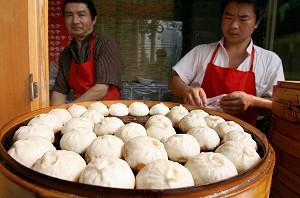NEW YORK–A recent report about buns with cardboard filling has created quite a stir. We interviewed Mr. Li Jianwei from Beijing, who owned his own food business for 8 years.
Mr. Li Jianwei owned his food wholesale business in China from 1992 to 2000. He even supplied the factory where the cardboard buns are made. When he was interviewed, he said he was not surprised to hear about the fake filling, because it is very common to buy food with inferior ingredients in China. He also said that this situation has existed for a long time. However, the media in Beijing eventually claimed that the news of cardboard in buns was fake.
This surprised Li, who said, “As far as I can remember, the media in China has never admitted to fabricating the news. I have never heard of such a thing and the journalist [involved] continues to report news about inferior food. I see no reason why he/she would make up such news...”
What’s more unbelievable to Li was that after the news was released, authorities said that they had completed a quality spot-check of 50 breakfast stalls and all of them had passed the test. Li said, “Such places lack sanitary equipment, the staff has not passed health exams, and so they do not have a permit to run a business. How could they possibly pass a quality check? In addition, authorities have issued a publication ban preventing other reporters from further reporting on the issue. This way whatever the authorities say is final.”
The places where cardboard buns were found are located in a business center frequented by people from out of town. People go there to do their food business. Li’s company used to be located there as well. He said there was a place opposite his company. The owner frequently bought 4 to 5 boxes of powdered detergent at a time. Li heard that to make the outside of fluffy dough sticks shiny, detergent was mixed into the dough. When Li asked the owner why he bought so much laundry detergent, the owner said it was needed to wash work clothes. However, there were only 6 or 7 people in the shop. The owner was nice to Li, and whenever Li visited his breakfast stall, he would tell him not to eat the deep-fried fluffy dough sticks.
In Li’s opinion, the Chinese regime is not really preventing such behavior. It is not that the businesses could not be controlled; the truth is that government officials benefit from them a lot. The stall owners may not be qualified to run a food stand, but after they pay local authorities some money, they are able to start the business because they are protected by those same local officials. Only when customers complain do the authorities fine the owners. But after paying the fine, the businesses remain open. The authorities are actually in partnership with these people in producing and selling contaminated food.
Li gave several examples. People heat up liquid brown sugar with salt and mix it in with cheap soy sauce. They find used soy sauce bottles off the street, print their own labels, fill them and then sell the inferior product for a profit. Regular chili peppers are mixed with red dye to be sold as Sichuan chili pepper, which is sold at a higher price. People often find the water turns red when they wash the chili peppers. People even put toxic ingredients in seasonings and to preserve shrimp and keep it looking fresher longer, dried shrimp are soaked in ammonia water.
Now living in New York, Li is especially vigilant about food imported from China in supermarkets. Not only are there harmful chemicals in the food but there is also an issue with the expiration dates being tampered with. The expiration date has already passed but the date is changed before the food is shipped to the supermarket. The owners of the supermarkets don’t even know the truth. Li has a friend who works for a wholesale company as a deliveryman. He said he does illegal things for his boss everyday. When he is not delivering, the owner asks him to smudge the old date on the food wrapper and put a new date on the cardboard cases.
He strongly suggests inspection of any food imported from China so that it can be eaten without fear. In China, any brand name food can be contaminated. Chinese outside of China should be vigilant. They should pressure the government and Chinese food stores. They need to stress food safety because it is related to everybody’s health and lives.
